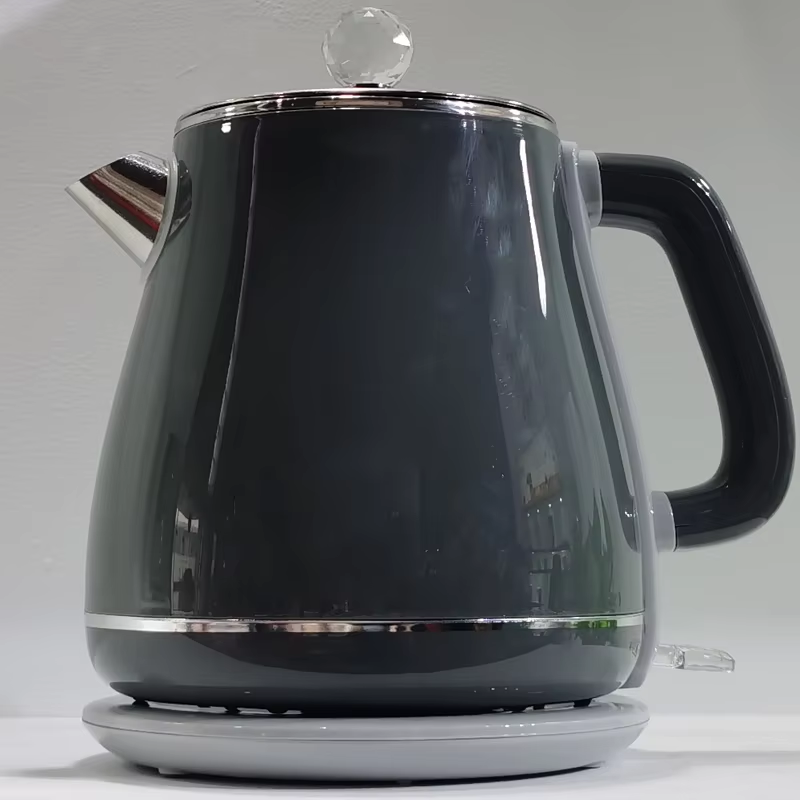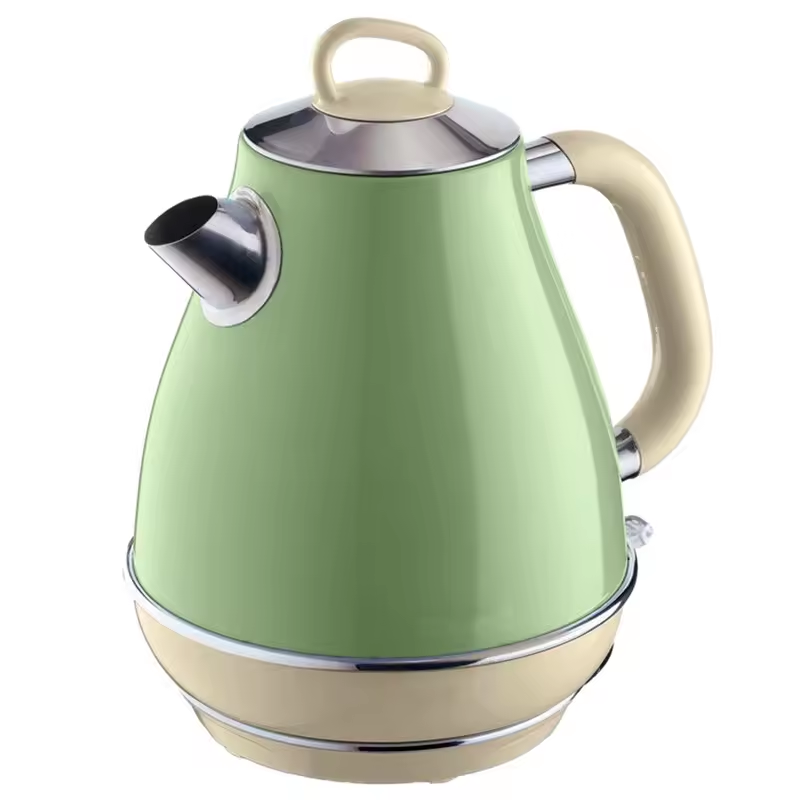Let’s be honest, the kitchen counter is a battleground for space. Between the coffee maker, the toaster, and that blender you swore you’d use every day, it can feel more cluttered than calm. Finding the right Kettle For Minimalists isn’t just about boiling water; it’s about reclaiming your space and investing in an object that is as beautiful as it is functional. It’s about choosing an appliance that does its one job perfectly, without unnecessary fuss. As a product consultant, I’ve seen countless kitchens transformed by a single, thoughtful choice. This guide is here to help you make that choice, ensuring your next kettle brings a sense of peace, not another piece of clutter, to your home.

What Exactly Defines a Kettle for Minimalists?
A minimalist kettle is defined by its focus on essentialism. It champions clean lines, an uncluttered interface, a compact footprint, and high-quality materials. It’s less about having a dozen features and more about performing its primary function—heating water—flawlessly and with elegance.
At its core, minimalism in product design is about stripping away the superfluous to reveal the object’s true purpose. Think of it as the opposite of the gadget that promises to do everything but does nothing well. A kettle for minimalists embodies this philosophy through:
- Intentional Design: Every curve, button, and material choice serves a purpose. There are no decorative-only elements.
- High-Quality Materials: Longevity is key. You’ll often find brushed stainless steel, borosilicate glass, or matte-finish ceramics that are built to last.
- Simple Functionality: Often, it’s a single switch or a discreet button. The user experience is intuitive, not a puzzle to be solved.
- Aesthetic Harmony: It’s designed to blend in, not stand out. Neutral colors like white, black, grey, or natural metallic finishes are common.
As product design engineer Dr. Alistair Finch once told me, “The best designs are often invisible. A great minimalist kettle does its job so well, you almost forget it’s there—until you admire how good it looks.”
The Evolution of the Humble Kettle
Believe it or not, the electric kettle has been around for over a century. The first models were clunky, inefficient, and a far cry from the sleek designs we see today. They often had the heating element in a separate compartment, meaning you were heating the kettle as much as the water.
The big leap forward came with the internal heating element, submerged directly in the water. This, combined with the invention of the automatic shut-off by Russell Hobbs in the 1950s, laid the groundwork for the modern kettle. This automatic shut-off, typically a bimetallic strip that bends when exposed to steam, is a perfect example of minimalist engineering—a simple, brilliant solution that enhances safety and convenience without a single screen or button. Today’s kettles have refined this technology for near-instant boiling times and unmatched energy efficiency.
How to Choose the Perfect Kettle for Minimalists
Finding the right kettle means looking beyond the price tag. It’s about matching an appliance to your lifestyle and your aesthetic. Here’s what I recommend you consider.
### Focus on Material and Durability
The material of your kettle impacts everything from taste to longevity.
- Stainless Steel (304 Grade): This is the workhorse. It’s durable, resists rust and corrosion, and doesn’t impart any flavor to the water. A brushed or matte finish is fantastic for hiding fingerprints and maintaining a clean look.
- Borosilicate Glass: For the purist. Glass allows you to see the water boil and ensures there’s no metallic taste. Look for models with a stainless steel base and lid to avoid plastic contact with hot water. The downside? They show mineral buildup (scale) more easily.
- Ceramic: A beautiful choice that offers excellent heat retention. Ceramic kettles can be heavier, but they bring a wonderful, earthy aesthetic to a kitchen.
### Consider Size and Countertop Footprint
For a minimalist, space is precious. A huge 1.7-liter kettle might be great for a large family, but if you’re typically just making one or two cups of tea, it’s overkill.
- Capacity: Look for smaller capacities, around 0.8L to 1.2L. This is more than enough for several cups and results in a physically smaller appliance.
- Base Design: A “cordless” design, where the kettle lifts off a 360-degree swivel base, is standard now. Pay attention to the base itself—some are more compact than others and may include cord storage underneath to keep things tidy.
### Evaluate Functionality: The Essentials
What do you really need? For many, it’s just an on/off switch.
- Single-Button Operation: The ultimate in simplicity. Flip the switch, the water boils, it clicks off. Done.
- Variable Temperature Control: Now, this is where it gets interesting. If you’re a true tea or coffee aficionado, this is one feature that isn’t superfluous. Different teas brew best at different temperatures. A kettle with a few discreet preset temperatures can elevate your daily ritual. For a deeper dive, you can explore our guide to variable temperature kettles.
- Gooseneck Spout: Essential for pour-over coffee lovers. The long, thin spout provides precise control over the water flow. Many gooseneck models are inherently minimalist in their design.
### The Pouring Experience
It sounds minor, but it’s not. A poorly designed spout will dribble water all over your counter. A well-designed “perfect pour” spout provides a clean, steady stream. Similarly, the handle should feel balanced and comfortable in your hand, even when the kettle is full. This is where user reviews and hands-on experience (if possible) become invaluable.
The Surprising Benefits of a Minimalist Kettle
Opting for a simpler, well-designed kettle goes beyond just aesthetics. It can genuinely improve your daily routine.
- Mental Clarity: A clutter-free counter contributes to a clutter-free mind. Starting your day in a calm, organized space can set a positive tone.
- Faster Boiling: Smaller capacity kettles often boil faster simply because there’s less water to heat.
- Energy Savings: By only boiling the amount of water you need in a smaller, efficient kettle, you use less electricity over time.
- Buy Once, Buy Well: A kettle for minimalists is often built with superior components, like a British-made Strix controller (the “brain” that controls temperature and auto shut-off). This means it’s an investment that will last for years, saving you money and reducing waste in the long run.
Keeping It Clean: Maintenance for a Longer Life
Even the best kettle needs a little TLC, especially in hard water areas. Limescale buildup is not only unsightly but can also affect your kettle’s performance and energy efficiency.
Here is a simple, chemical-free way to descale your kettle:
- Create the Solution: Fill the kettle halfway with a 1:1 solution of white vinegar and water.
- Let it Sit: Allow the solution to sit for at least an hour. For heavy buildup, you can leave it overnight.
- Boil (Optional but effective): Bring the solution to a boil, then turn the kettle off and let it sit for another 30 minutes.
- Rinse Thoroughly: Pour out the solution and rinse the kettle with fresh water several times to remove any lingering vinegar smell or taste.
- Final Boil: Fill the kettle with fresh water, boil it, and discard the water. This ensures it’s perfectly clean for your next cup of tea.
For more detailed instructions, check out our complete article on how to safely descale your kettle.
Frequently Asked Questions (FAQ)
Q: Are minimalist kettles more expensive?
A: Not necessarily. While some high-end designer brands can be pricey, many affordable options from reputable brands focus on simple, quality design. The key is value; you may pay a bit more for durable materials like stainless steel over plastic, but it will last much longer.
Q: What is the best material for a kettle for minimalists?
A: Brushed stainless steel is arguably the best all-around choice. It’s incredibly durable, easy to clean, doesn’t affect the taste of the water, and has a timeless aesthetic that fits perfectly with minimalist principles.
Q: Do minimalist kettles have advanced features like temperature control?
A: Yes, many do! Minimalism is about intentional features, not a total lack of them. You can find beautifully designed kettles with discreet variable temperature controls that are perfect for tea and coffee enthusiasts who need precision without a cluttered interface.
Q: Is a gooseneck kettle a good minimalist choice?
A: Absolutely. Gooseneck kettles are designed for a specific purpose—pour-over brewing—and their form follows that function perfectly. Their slender, elegant design is often very minimalist and looks beautiful on a countertop.
Q: How long should a good quality minimalist kettle last?
A: With proper care and regular descaling, a well-made kettle from a trusted brand should last for many years, often 5 to 10 years or even longer. Look for kettles with a good warranty and components like Strix controllers, which are tested for thousands of cycles.
Your Countertop, Curated
Choosing a kettle for minimalists is more than an appliance purchase; it’s a statement about how you want to live. It’s about finding joy in objects that are simple, beautiful, and exceptionally good at what they do. By focusing on quality materials, essential functions, and a design that brings you peace, you’re not just buying a kettle—you’re curating your environment. You’re making a conscious choice to invite calm and quality into your daily ritual. So, take your time, consider what truly matters to you, and find the perfect kettle that will serve you well for years to come.



